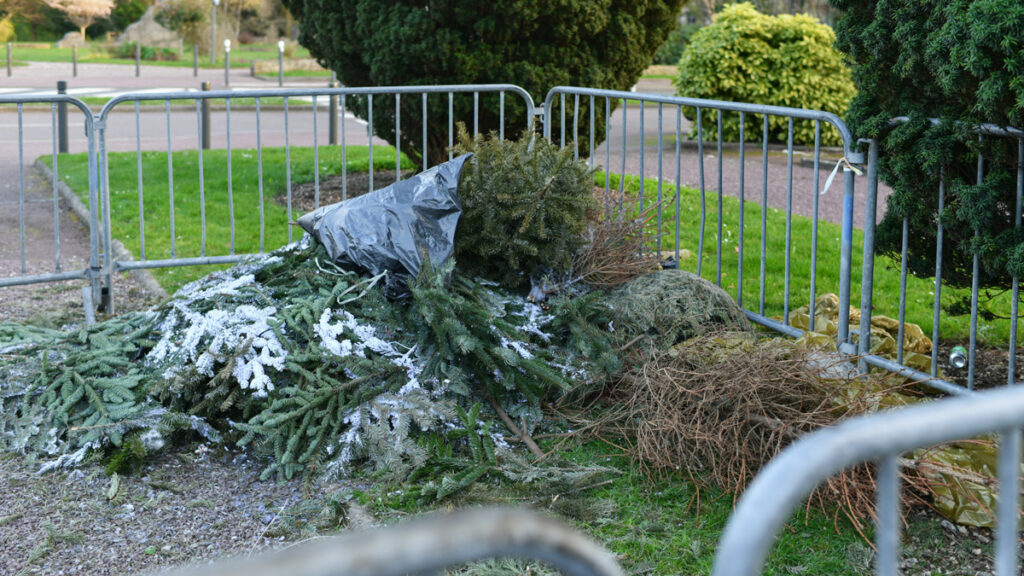The dark environmental impacts of our Christmas season

Christmas – a time of indulgent over-consumptions with friends and family and an industry worth £42bn to the UK economy. It may seem like the most wonderful time of the year, but our annual festivities have some shocking environmental consequences.
Christmas dinners – 150 million miles worth of carbon emissions
Environmentalists argue Christmas is the world’s greatest annual environmental disaster.
Our over-excessive eating habits during Christmas cause the same carbon footprint as a single car travelling 6,000 times around the globe, according to a University of Manchester study. As a nation, we consume 80 per cent more food over the Christmas season than during the rest of the year, spending on average over £174 per household on food for just one day. Our Christmas traditions include 10 million turkeys, 370 million mince pies and 205 million glasses of champagne consumed by UK households.
How else does Christmas impact our environment?
Everything during the festive season occurs at mass.
We use 125,000 tonnes of plastic packaging for gifts with an astonishing amount ending up in our oceans. Combined, we travel 6 billion miles around the UK to see friends and family.
We send enough Christmas cards that if we placed them alongside each other, they’d cover the world’s circumference 500 times. Per 1kg of wrapping paper, 3.5kg of CO2 is emitted for its production. Times that by the 227,000 tonnes we use yearly, and that’s outrageously contributing to our ever-growing carbon emissions.
Our love of lights at Christmas isn’t just damaging for electricity use, it can cause confusion for the wildlife who struggle with the sudden illuminations.
Is all of this really necessary to have an enjoyable holiday season?
Christmas – ‘tis the season of waste
At a time when we’re boycotting palm oil use and looking at alternatives to avoid horrific deforestation, we don’t bat an eyelid at the 8 million trees that are cut down each year for UK households to show off their yearly decorations on Facebook.
With eyes bigger than our bellies, the average Brit spends over £40 on wasted food. Collectively, we bin 230,000 tonnes of unneeded Christmas treats. The equivalent to 74 million mince pies or 2 million turkeys.
By March, 41 per cent of toys will have broken or our children will be bored of them, most of which will go straight to the tip.
Imagine the way we could jointly better the health of the environment if we all took some responsibility.
The influence of Christmas promotions, adverts and sales
It can be difficult to avoid the persistent and captivating Christmas offers and promotions. We are psychologically, socially and culturally invested in a season of overeating, over drinking and exchanging superfluous gifts.
Without even realising it, we measure and compare our self-worth to others by the quantity and quality of presents that we gift. A selfish subconscious motive? Something that companies manipulate to exacerbate our consumerism.
All this emotive marketing at Christmas, seen by judging the best yearly Christmas advert which makes you shed a tear, shapes us into a norm of spending more than we realise. It’s a time of year when we do things in excess, but unfortunately, this has a much greater impact on the environment.
How to have a green Christmas
We are influenced to meet the commercial expectations of food spilling over the tables and presents stocked so high you can’t see the tree. And then we expect someone else to take accountability to lead the movement towards more a sustainable and ethical Christmas. But we can all take a role, albeit even if it’s just a few small changes.
There are many easy and cheap ways to have a green Christmas and reduce your Christmas carbon footprint. You don’t need to become Scrooge and turn the lights off or have a Christmas dinner Gordon Ramsay would laugh at.
Reuse your Christmas cards as tags for next year’s presents. If arts and crafts aren’t your thing, just recycling our cards would save enough energy to light up 340 Blackpool illuminations.
Switch your fancy glittery wrapping paper for the standard printed paper and it can go straight into the recycle bin. If we all did this, we’d be recycling the paper for 1.5 billion Christmas presents.
Do you really need all those nibbles and extra desserts in case your guests go hungry? Before doing your annual Christmas food shop, take a list and stick to it. Don’t let the supermarket offers stray you into thinking you need that extra box of After Eights. Not only will you be saving money, you’ll also be reducing your waste.
Where to buy eco-friendly gifts
The Go Green Movement provides many great alternatives for sustainable and ethical presents. The Ethical Superstore sells stunning gifts, from clutch bags to organic wine. The Green Tulip even sells environmentally friendly gifts for your pets!
If you’re stuck on gift ideas, an experience may be a better choice than traditional presents. Not only does this cut your packaging to zero, you’ll also be giving a memory for life.
We waste £4bn on unwanted gifts a year, so take a second think as to whether it’s really necessary and you’ll help to reduce CO2 emissions by 8kg per individual.
Our three days of festivities astonishingly equates to 5.5 per cent of the UK’s annual total carbon footprints, so whilst you’re sipping on your special wine and unravelling your presents, take a second to consider the destructive impacts we’re having on our environment and ways you can help steer us towards more environmentally friendly Christmas traditions.

